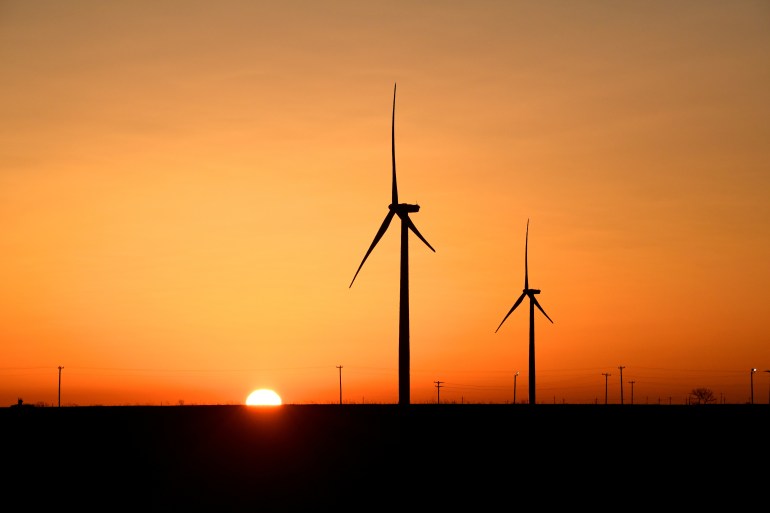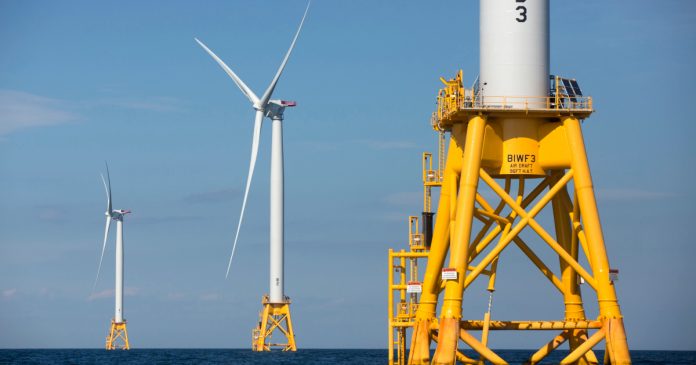[ad_1]
Vineyard Wind project, part of Biden administration goals, could see up to 84 turbines offshore from Martha’s Vineyard.
United States President Joe Biden’s administration announced final federal approval for an ambitious, first of its kind offshore wind energy project on Tuesday that would create enough electricity to power 400,000 homes.
The 800-megawatt Vineyard Wind project, south of Martha’s Vineyard near Cape Cod, Massachusetts, would be the first utility-scale wind power development in federal waters. The nearly $3bn project is a critical part of the Biden administration’s plan to develop renewable energy in the US.
The federal approval allows Vineyard Wind to install 84 or fewer turbines off the Massachusetts coast.
Secretary of the Interior Deb Haaland said the approval of the largescale renewable energy project will create thousands of jobs and is a step towards Biden’s plan for 30 gigawatts of offshore wind by 2030.
“A clean energy future is within our grasp in the United States. The approval of this project is an important step toward advancing the Administration’s goals to create good-paying union jobs while combatting climate change and powering our nation,” Haaland said in a statement.
“Today is one of many actions we are determined to take to open the doors of economic opportunity to more Americans.”
 Wind turbines operate at sunrise in the Permian Basin oil and natural gas production area in Big Spring, Texas, on February 12, 2019 [File: Nick Oxford/Reuters]
Wind turbines operate at sunrise in the Permian Basin oil and natural gas production area in Big Spring, Texas, on February 12, 2019 [File: Nick Oxford/Reuters]
The project is a $2.8bn joint venture of Avangrid Renewables and Copenhagen Infrastructure Partners. Vineyard Wind CEO Lars T Pedersen called the approval “not about the start of a single project, but the launch of a new industry”.
He also said the approval “means the jobs, economic benefits and clean energy revolution” associated with the project can come to fruition.
The approval of the project, which could be completed in about two years, came after decades of debate about the sustainability of US offshore wind.
The project follows the scrapped Cape Wind project, which failed after opposition from some high-profile liberals and conservatives alike. Supporters of Vineyard Wind have said the newer project is better sited than Cape Wind, which would have been closer to shore, and that it is more in tune with today’s political climate.
But Vineyard Wind also faces opposition. Commercial fishing businesses have said the growth of offshore wind projects off the East Coast would make it difficult for them to harvest valuable seafood species such as scallops and lobsters.
Today, @SecDebHaaland and @SecRaimondo announced approval of the Vineyard Wind project — the first large-scale, offshore wind project in the U.S. The project will create 3,600 jobs and provide enough power for 400,000 homes and businesses.https://t.co/y829LApojw
— US Interior Press Team (@USInteriorPress) May 11, 2021
The Responsible Offshore Development Alliance (RODA), a coalition of fishing groups and businesses, characterised the approval of the project as a sellout to multinational corporations that hope to profit on offshore wind in the US.
“For the past decade, fishermen have participated in offshore wind meetings whenever they were asked and produced reasonable requests only to be met with silence,” Annie Hawkins, RODA’s executive director, told the Associated Press.
“From this silence now emerges unilateral action and a clear indication that those in authority care more about multinational businesses and energy politics than our environment, domestic food sources, or US citizens.”
But environmental groups and clean power advocates trumpeted Tuesday’s approval. Heather Zichal, chief executive officer of the American Clean Power Association, called it an “historic day for clean energy and for our country”.
The Vineyard Wind project is another great example of the all-of-government approach we need to battle the climate crisis.
I look forward to continuing our work together, @SecRaimondo! https://t.co/CULYNsNwqi
— Secretary Deb Haaland (@SecDebHaaland) May 11, 2021
She continued: “Now is the time to push forward on offshore wind, catch up to global competitors, and decarbonise our electric grid, so that the US can deliver economic and environmental benefits to our citizens and combat climate change.”
[ad_2]
Source link











